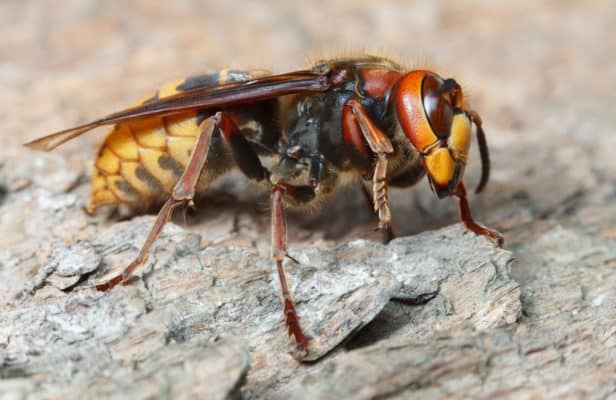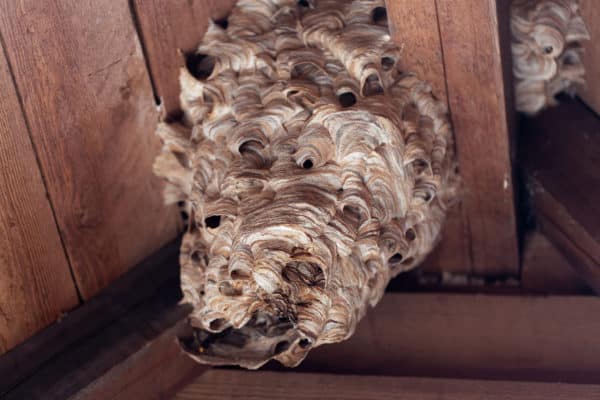
It’s European Hornet season again! European Hornet activity begins in Spring, when the fertilized queen seeks a new nest site for her colony. As more workers hatch throughout the summer, the colonies grow. They become a significant problem by mid- to late-summer when the colonies reach their peak numbers. Hornets are social insects and will sting repeatedly if they feel threatened or feel their nest is in danger. By the end of summer, the nests can be very large and hold hundreds of wasps. Attempting to remove or even approaching a nest can be very dangerous. Modern Pest can help by removing or treating the nest.
If you’ve seen European hornet nests on your property, don’t try to remove them yourself. Call Modern today at 1-800-323-7378.
Physical Features
- European hornets are about 3/4 to 1 1/2 inches long.
- They are brown with yellow abdominal stripes and a pale face.
- They have two pairs of wings, six legs, and antennae.
Habitat & Diet
- The grayish paper nests of European hornets are not usually seen because they prefer to build them in hollowed out logs, trees, or cavities in buildings. They can be quite impressive in size.
- Nests that are not covered by an external structure have a brown papery envelope. Nests that are sheltered have little or no envelope covering their cells.
- European hornets are carnivorous and hunt large insects such as beetles, wasps, large moths, dragonflies, and mantises. They also enjoy fallen fruit and sugary food.

Reproduction
- Once she has mated, the European hornet queen uses chewed-up wood fibers to build a paper nest. Eggs are laid in the cells, and as they hatch, the larvae are fed by the queen. As the colony grows, the workers take over enlarging the nest and feeding the larvae, leaving the queen to produce eggs.
- Queens dominate hornet hives and are the only females to reproduce. Most of the other occupants are asexual female workers that perform important duties such as building the hive, gathering food, feeding the young, and defending the colony. There are far fewer male hornets, or drones, in the colony and their only role is to mate with the queen. Males usually die soon after this task is complete.
- Before the queen dies, she will produce a generation of new queens and drones to continue the life cycle.
The Dangers
- European hornets generally avoid conflict with humans but will aggressively defend their nest and food sources. Their sting can be life-threatening to people who are allergic to their venom.
- European hornets communicate with each other through behaviors or pheromones. They will perform an alarm dance outside of their nest that consists of consistent buzzing, darting in and out of the nest, and attacking or approaching the targ 301 permanently redirect the secure (https) page to the correct http version. This will mean the search engines drop the https out of the index, rank the correct http version and pass any link equity (or pagerank!) to the correct version of the page. If you can’t use a 301 redirect, then try using the canonical link element instead. Obviously make sure you haven’t blocked any of the pages you are going to redireet of the alarm pheromone.
- Always avoid killing a hornet anywhere near its nest, as the distress pheromones it releases have a good chance of triggering an attack. You should also remove anything that touches the pheromones from the area immediately, like your clothes. Hornets can misinterpret the scent from certain perfumes and other volatile chemicals, which may falsely initiate an attack.
Modern’s Homecare Green service protects against over 50 common household pests, including stinging insects like European hornets, yellowjackets, and paper wasps. Click here to schedule service online, or call 1-800-323-7378.
Prevention
- To reduce the risk of encountering hornets and other stinging wasps, remove waste frequently and maintain tight lids on trash cans.
- Change exterior lights to yellow bulbs to reduce attraction to your home or property.
- Promptly remove any fallen fruit from trees, as it attracts these hornets.
The Modern Solution
Hornets can be dangerous, especially for people who are allergic to their venom. They will aggressively defend their nests and can sting multiple times. Don’t attempt to treat or remove a nest on your own. Call Modern Pest to treat the nest for you. Modern can also keep them from building more nests with preventative treatments around your home.
If you suspect a European hornet infestation or find a nest on your property, contact Modern Pest at 1-800-323-7378 or click here to schedule service online. Our Homecare Green program protects against over 50 common household pests, including European hornets and many kinds of wasps.
